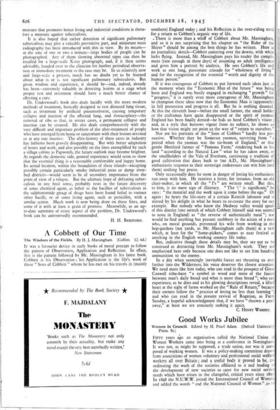A Cobbett of Our Time
The Wisdom of the Fields. By H. J. Massingham. (Collins. 12. 6d.) IT was a favourite device in early books of moral precept to follow the pattern of Observation, Application and Reflection. In effect, this is the pattern followed by Mr. Massingham in his latest book. Cobbett is his Observation ; his Application is the life's work of those " Sons of Cobbett " whom he has met on his travels in (mainly southern) England today ; and his Reflection is the over-riding need for a return to Cobbett's organic way of life.
. There is more than a whiff of Cobbett about Mr. Massingharn,
and so it is not surprising that his chapter on " the Rider of the Shires " should be among the best things he has written. Here is no journalistic sketch—Cobbett cantering over the downs, with white locks flying. Instead, Mr. Massingham pays his reader the compli- ment (rare enough in these days) of assuming an adult intelligence and gives him a portrait by analysis. He sees Cobbett's life and work as one long, passionate crusade for " wholeness of living " and for the recognition of the essential " worth and dignity of the human person."
If it was courageous of Cobbett to put forward such ideas just at the moment when the " Economic Man of the future " was being born and England was busily engaged in exchanging " growth " for " progress," it is surely even more courageous of Mr. Massingham to champion these ideas now that the Economic Man is (apparently) in full possession and progress is all. But he is nothing daunted. At this the eleventh hour—before the small farmer, the small holder or the craftsman have quite disappeared or the spirit of yeoman England has been finally denied—he bids us heed Cobbett's vision ; and, in a style that borrows vigour from its subject, he shows us how that vision might yet point us the way of " return to ourselves."
Nor are his portraits of the "Sons of Cobbett " hardly less per-
suasive. Whether they be Somerset yeomen, surviving from "3 period when the yeoman was the tie-beam of England," or that gentle Hereford farmer of " Pomona Farm," rendering back to his land " according to the Natural Law "• what he has taken away, or the smallholders of the Vale of Evesham, continuing a tradition of good cultivation that dates back to 700 A.D., Mr. Massingham's enthusiastic response to their sovereign endeavours can win him (and them) nothing but praise.
Only occasionally does he seem in danger of letting his enthusiasm
run away with him. He receives a letter, for instance, from an old chair-maker, in which all the " I's " are written small. But this, to him, is no mere sign of illiteracy. "The `i ' is significant," he says : " the material and the work upon it come before the ego." Or again : he hears the life-story of a certain Kentish labourer and is stirred by'his delight in what he hears to re-create the story for our example. But nobody who knew the Medway valley would speak of this district (one stretch of which Cobbett himself said was second to none in England) as " the reverse of authentically rural "; nor would he find anything but peasant snobbery in the action of a man who, on moral grounds, prevented his wife from working in the hop-gardens (not yards, as Mr. Massingham calls them) at a task which, at least for the "home-pickers," comes as near festival as anything in the English working country life today.
But, indicative though these details may be, they are not to be construed as detracting from Mr. Massingham's work. They are emphasised here only because one does not like to see him handing ammunition to the enemy.
In a day when seemingly inevitable forces are thrusting us ever farther into the Wilderness, his voice deserves the closest attention. We need more like him today, who can read in the prospect of Great. Coxwell tithe-barn " a symbol in wood and stone of the fusion between man's daily bread and what is more than bread "-' who can experience, as he does and as his glowing descriptions reveal, a lifted heart at the sight of farms worked on the " Rule of Return," because their owners follow the " practice of loving no less than learning "; and who can read in the present revival of Rogation, as Farm Sunday, a hopeful acknowledgment that, if we have " thrown a pea:' away," at least we are anxiously seeking it again.
C. HENRY WARREN.






























 Previous page
Previous page